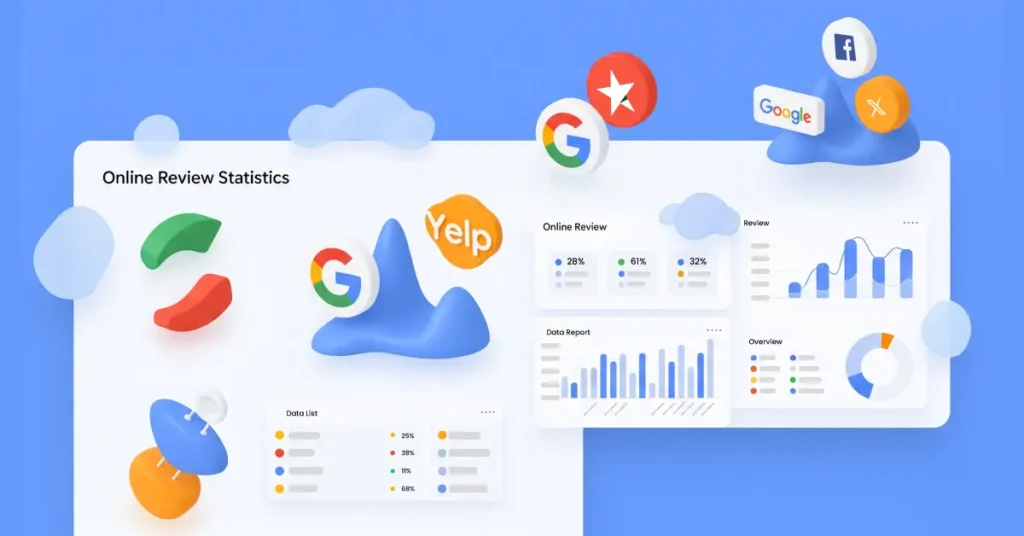Every local business owner knows the sinking feeling of spotting a harsh Google review pop up. It is frustrating, especially when it is blatantly fake or unfair. Wouldn’t it be nice if you could simply flip a switch and turn off Google Reviews altogether?
The honest answer: you can’t turn off Google reviews for your business. Google deliberately locks this feature to preserve transparency and consumer trust on its platform. In other words, every Google Business Profile is open to public feedback by design.
So, what now?
While Google won’t let you hide or remove the reviews section, you can learn to live with it. I am here to help you turn your frustration into a game plan!
Why Local Business Owners Want to Turn Off Google Reviews
There are different reasons why every business owner gets frustrated when there’s an influx of Google reviews. I have categorized them under the different impacts they have on the owners and their businesses:
Common Frustrations with Reviews
Many entrepreneurs always feel held hostage by the reviews on their profiles. Some of the most common complaints include:
- Fake or spam reviews that harm your reputation
- One-star ratings with no explanation
- Negative reviews from competitors or ex-employees
Emotional Toll & Impact on Business
Beyond just bruising your ego, negative Google reviews can have real consequences for your business’s success and your personal stress levels. These include:
- Reputation damage and lost customers
- Fear of being judged unfairly
- Local SEO impact (dragging down your local prominence)
All these frustrations make the temptation to “turn off” reviews completely understandable. Nobody likes feeling at the mercy of random internet judgments or fake attacks. However, Google has very intentional reasons for keeping reviews mandatory.
Why Google Doesn’t Allow You to Turn Off Reviews
From Google’s perspective, reviews are a core feature of the platform. They are not an optional add-on that businesses can opt out of. Here are the main reasons Google insists on keeping the review system intact:
- Commitment to Transparency and Trust: Google’s entire business model for local search is built on authentic user feedback. Reviews help establish trust for consumers. If business owners could simply hide or delete all their reviews, the credibility of Google’s review platform would collapse.
- Consistent User Experience: Imagine searching for a restaurant on Google and seeing “Reviews disabled by owner” on one listing, while others have star ratings and comments. That inconsistent experience would confuse users.
- Local SEO and Platform Credibility: Google also uses review data as a factor in its ranking algorithm. The quantity and quality of reviews signal how reputable and popular a business is.
- Exceptions to the Rule: Are there any cases where Google itself will turn off or remove reviews? Yes, but they’re rare and entirely at Google’s discretion. For instance, if a business undergoes a major change (like a complete rebranding or category change) or is subject to an extreme “review bombing” incident, Google may step in behind the scenes.
Bottom line: Google’s stance is firm. You cannot manually turn off Google reviews for an active business profile.
When Google Might Temporarily Restrict Reviews
While you, as a business owner, can’t flip a switch on reviews, Google’s system may occasionally put reviews on pause under specific circumstances. These situations aren’t common, but they do happen:
- Automatic Protections During Review Attacks: If Google detects an abnormal flood of negative reviews hitting your profile in a short time, it might algorithmically sense a spam or “review bombing” campaign.
- Google-Enforced Review Shutdowns for Policy Violations: Google has also agreed to crack down hard on businesses caught manipulating reviews.
What to Do Instead of Turning Off Google Reviews
Since hitting “OFF” isn’t an option, how can you deal with negative, fake, or unfair reviews? I propose the following proactive approaches as your toolkit for reputation management on Google:
- Flagging fake or policy-violating reviews
- Responding strategically to negative reviews
- Encouraging authentic positive reviews
- Last resort: temporarily marking your business as closed
- Use Google’s support tools if needed
SEO and Reputation Impact of Disabling or Suppressing Reviews
It is worth understanding that having no Google reviews (or hiding them) isn’t actually good for you. Even if it were possible, turning off reviews would likely hurt your online visibility and credibility more than bad reviews do! Here is why:
- Google reviews boost your local search rankings: Google itself acknowledges that the quantity and quality of reviews influence local SEO ranking. If you somehow removed all your reviews, you’d be removing a key ranking factor.
- Lack of reviews = lack of trust: Today’s consumers rely on reviews heavily when making decisions. A staggering 95% of people read online reviews before making a purchase or visiting a business. If your business had zero reviews (or if somehow your reviews were hidden from view), that is a huge red flag to potential customers.
- User engagement and content: Reviews add fresh user-generated content to your Business Profile. Keywords in reviews can even help you show up for specific search queries.
- Missed feedback = missed improvement opportunities: From a reputation standpoint, turning off criticism means you’d never hear important feedback that could help you improve your business.
- Long-term brand health: Embracing reviews is part of building a strong brand nowadays. Businesses that actively manage and cultivate their reviews tend to build a loyal customer base and a positive online word-of-mouth loop.
Smart Reputation Management Practices
Since we have established that you can’t and shouldn’t eliminate reviews, the winning move is to master the art of reputation management. Here are some best practices to adopt for the long haul:
Regular Monitoring & Fast Response (Within 24-48 Hours)
Make it a habit to keep a close eye on your incoming reviews. This doesn’t mean obsessively refreshing Google every hour, but you should have a system to alert you when new reviews come in.
The quicker you know about a review, the quicker you can respond or take action if needed. Many business owners set aside a few minutes each day or week to check all new reviews across platforms. You can also use tools (or Google’s own notifications) to email you for new Google reviews.
Using Review Management Tools
You don’t have to do all this manually or alone. There are review management tools and platforms that can greatly streamline the process of tracking, responding, and encouraging reviews.
The key is to find one that integrates well with your business processes. Many businesses choose tools that can handle multi-platform reviews, automate asks (via email/SMS), and provide response templates or guidance.
Long-Term Strategy – Build a Review Ecosystem
The most successful local businesses don’t treat reviews as an afterthought. They build an entire ecosystem that continuously generates and leverages reviews. What does this mean for you? It means integrating reviews into the DNA of your business’s marketing and customer service strategy.
Here are some components of a healthy review ecosystem:
- Consistently Encourage Feedback: Make requesting reviews an ongoing part of your customer interaction. Not just a one-time campaign when you need it, but part of your standard operating procedure. Train your team: after a successful service, always mention reviews. Include a review request in your email newsletters or receipts. The idea is to create a steady stream of incoming reviews over time, rather than sporadic attempts.
- Diversify Your Review Platforms: Google is the most popular, yes, but don’t neglect other important platforms like Yelp, Facebook, TripAdvisor, or industry-specific sites.
- Learn From Feedback: Make it part of your company culture to periodically review your reviews internally. Are multiple people mentioning slow service at lunch hours? That is a cue to adjust staffing. Do many rave about a specific product or staff member? Highlight those strengths more in your marketing.
- Showcase Your Reviews: Don’t just let reviews sit on Google. Feature snippets of great Google reviews on your website (“Testimonials” section) or social media posts.
- Respond to Positives, Not Just Negatives: Replying to positive reviews with a simple thank you and a warm message shows gratitude and keeps those customers feeling valued.
Remember, each review is a conversation. The more you encourage and participate in those conversations, the more you shape the narrative about your business online.
Don’t Turn Off Reviews – Manage Them Instead
It is understandable to feel that Google reviews are a double-edged sword. One day, you are on top of the world with a 5-star rave, the next day, a bitter comment knocks the wind out of you. But, the answer is not to hide from Google reviews, but to tackle them head-on with a solid strategy.
Embrace the mindset that reviews are an opportunity, not just a liability. Each review (good or bad) is a chance to demonstrate your business’s values to the world.
Ideally, you don’t have to do it all alone. Invest in tools and systems that make review collection a breeze for you. This is where a solution like Krofile’s review collection tool becomes invaluable. Instead of wrestling with the Google review system, let Krofile help streamline the process.
Don’t Turn Off Reviews – Learn to Leverage Them
It’s completely normal to feel like Google reviews are a double-edged sword. One day, a glowing 5-star review lifts your spirits—and the next, a single bitter comment can feel like a gut punch. But the solution isn’t to avoid reviews altogether. It’s to face them with a smart, long-term strategy.
Shift your mindset: reviews aren’t just risks—they’re opportunities. Each one, good or bad, gives you a chance to show who you are as a business. And the more positive reviews you collect, the more those occasional negative reviews get buried and lose their impact.
The good news? You don’t have to do it all manually. Tools like Krofile make it easy to collect reviews from your happy customers using QR codes, NFC taps, and shareable links—so you build a steady flow of positive feedback over time.
You may not be able to control what people say, but you can make it easier for satisfied customers to speak up.








